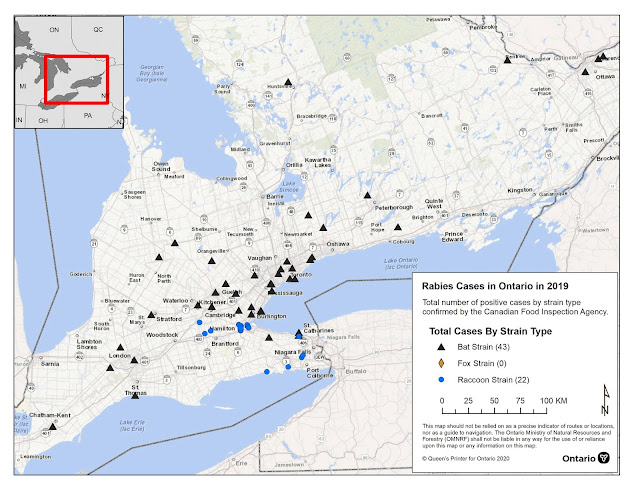Rabies risks: Thinking about not vaccinating your pet against rabies? Here's what you need to know
I'm one of the many folks across the world anxiously waiting for a COVID-19 vaccine. Vaccines are one of the most impactful inventions for humanity, and working in veterinary medicine has allowed me to experience first hand the power of vaccines. Watching a puppy die from canine parvovirus is a devastating experience, but it has given me a deeper respect for vaccines. Especially the rabies vaccine. Rabies is a fatal disease that affects mammals. Rabies is a zoonotic disease, meaning it can be transmitted from animals to humans. Non-mammals, including fish, poultry, birds, reptiles, and amphibians can’t get rabies. Rabies is spread through the saliva of an infected animal. The animal bites a human or animal, breaking the skin, and the infected saliva gets into the wound, passing the disease on to the victim. You can also become infected by getting saliva, brain or spinal tissue from an infected animal (dead or alive) in an open cut, sore, wound, eyes, mouth, or nose.
Wildlife is the primary carrier of rabies. In 2019 here in Ontario, bats were the primary carriers of rabies. Raccoons, skunks, and foxes also carry the disease in Ontario. People, pets, livestock, and wildlife can be vaccinated against the disease, and even though the vaccine is available, there were still 65 new cases of rabies in Ontario in 2019. Some pet owners choose not to vaccinate their pets against rabies. Vaccine fear-mongering and misinformation fuels a lot of these decisions, but some pet owners don't want to over-vaccinate their pets. If you are on the fence about vaccinating your pet against rabies, these are things you should consider when making your decision.
Rabies vaccine for your pets is mandatory in Ontario- it's the law
Whether you decide to vaccinate or not, in Ontario it is required by law. So if you decide not to do it, you are risking being fined- and forced to vaccinate anyway. This includes indoor cats.
You need it to travel with your pet
Planning a vacation across the border with your pet? You better have records of an up-to-date rabies vaccine. Rabies is required to travel to almost everywhere outside of Canada. Some countries, like Australia and New Zealand, even require bloodwork for your pet called titer testing that checks for the presence of certain antibodies in the bloodstream, measuring the body's immunity against the disease, before you are allowed to bring your pet there.
Pets who don't go outside are still at risk
You may think since your pet doesn't come into contact with wildlife, there is no risk of rabies. The primary carriers of rabies- bats, raccoons, skunks- are urbanized animals. Bats are often found in attics of houses or in basements. Raccoons enjoy city life, dining on garbage behind apartment buildings. Your indoor-only cat is still at risk.
Rabies is not extremely prevalent anymore, do you want to know why?
Something I hear all the time form pet owners is "We don't have tons of positive rabies cases, so why should I vaccinate?" The reason we don't see that many rabies cases is because we do vaccinate. Vaccinating against rabies has become standard practice. Humans, pets, and livestock are almost all vaccinated against rabies. That leaves wildlife. 'Rabies baits' are vaccines that are dropped in the wilderness with the intent that wildlife will consume them and be vaccinated. Once we can catch, vaccinate, and release all wildlife, we will eliminate the risk. Sadly that is impossible- so we have a responsibility to continue to vaccinate our livestock, pets, and ourselves.
If your pet bites someone, you could be in serious trouble
Your pet may not have an aggressive temperament, but there is no way to guarantee that your pet will never bite a person. Pets are animals, and animals are unpredictable. In the event that your pet does bite a person, and the bite breaks the skin and draws blood, by law you must report the bite to your local health unit. If the bite takes place at a veterinary clinic, the clinic has a responsibility to report it, and if the victim of the bite visits a human health practitioner or hospital for treatment, they are responsible for reporting it as well. The health unit will then obtain your pet's vaccination history. If your pet is not up-to-date on the rabies vaccine then you could be asked to quarantine that pet at home for some time- even upwards of two weeks. You may be fined and ordered by law to have your pet's rabies vaccine administered. In extreme cases, your pet may be ordered to be euthanized, and the health unit will remove your pet's head (not kidding!) so that rabies testing can be performed the only way possible- by testing brain matter. So maybe just vaccinate your pet?
If your pet gives you rabies, you may die
So grim fact, over time our immunity to rabies can weaken- even if we were properly vaccinated as children. So if you are bitten by an infected animal, your pet included, and you are no longer immune to the disease, you may die. Treatment for rabies is painful and not always effective. Rabies is almost always fatal.
Vaccinating to prevent disease is always less expensive than treating disease
Vaccine appointments may seem costly. I ask pet owners to evaluate the true cost of not vaccinating their pets. You can pay once a year (sometimes once every three years depending on vaccine schedule, animal species, and vaccine manufacturer) to vaccinate your pet against rabies. Or you can pay the cost of watching your animal suffer a slow and painful death, risking spreading it to other animals or yourself, creating a localized epidemic in your community, and paying five times the money you would have paid for vaccines trying to keep your pet comfortable during its final days. It seems like a no-brainer to me.
It has never been a question for me- do I vaccinate my pet against rabies? Of course I do! But anti-vaxxers have spilled into the pet-owner world, and it has made for troubling times. When anti-vaxxer rhetoric was at its peak two years ago, I saw a parvovirus epidemic in my community. I watched puppies die, and owners who couldn't pay thousands of dollars to treat be forced to euthanize their new furry family member. Those who work in the veterinary community held lifeless puppies in our arms, dressed in full PPE, and cried for them like they were our own. I'll never forget it. Because of this, I'm not willing to keep my mouth shut when it comes to the importance of vaccines. Today, September 28, is World Rabies Day. Please spread the word.
























0 Comentarios